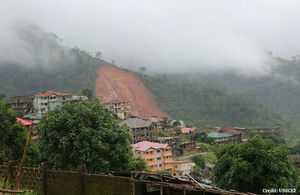UK Public Health Rapid Support Team (UK-PHRST) deploys to Sierra Leone
The UK-PHRST is deploying to Sierra Leone to help reduce the risk of a disease outbreak following the deadly landslides in Freetown.

Following natural disasters, outbreaks of water borne diseases such as cholera can occur, particularly where there is a lack of access to clean water and sanitation. Given the scale of the disaster in Freetown, the local capacity to detect and control a disease outbreak is limited and the Government of Sierra Leone has requested international support.
The UK-PHRST team deploying includes experts in tracking the progress of an outbreak (epidemiologists) and diagnosing its cause (microbiologists), as well as a logistician.
The team will be working alongside Sierra Leone health system professionals and other experts in disaster relief to support the Sierra Leone government’s response.
UK-PHRST is jointly run by Public Health England and the London School of Hygiene & Tropical Medicine and is funded by the UK government. It continually monitors infectious diseases and other hazards globally, identifying situations where the deployment of specialist expertise could prevent these threats from turning into a global outbreak.
Professor Daniel Bausch, Director of the UK-PHRST said:
Sierra Leone is working to stop a tragedy becoming a major public health issue. Our team of specialists will support its health professionals with enhanced surveillance for water-borne diseases, such as cholera, which often appear in the wake of extreme rainfall and flooding. The people of Sierra Leone have shown extraordinary resilience since the Ebola outbreak and we are working alongside them as we tackle this latest disaster together.
Health Minister Philip Dunne said:
This disaster is a tragedy for Sierra Leone and I am pleased our new rapid support team is helping to protect lives.
In this first bilateral deployment our specialists will save lives on the ground working with local professionals to prevent disease outbreaks. By assisting to halt the spread of disease at the source, not only do we protect those in Sierra Leone but also citizens across the world, including the UK.
International Development Secretary, Priti Patel said:
The UK stands by Sierra Leone in its time of need, stepping up with new emergency support to get food, water and medicine to people who have lost everything.
British expertise is also leading the fight against global health threats ensuring that disease doesn’t take hold in the aftermath of disasters.
The Rapid Support Team is just one way we are helping ensure that countries and the international system are better prepared to effectively tackle the preventable and treatable diseases that still plague countless people today. This will build a safer and healthier world which benefits us all.
As the UK-PHRST’s deployment progresses, it will continue to provide support and share expertise with our partners in Sierra Leone to strengthen the health system beyond the immediate response.
The UK government has remained in Sierra Leone throughout the post-Ebola period, with Public Health England helping to strengthen health systems and further developing the ability to respond to such disasters and prevent outbreaks.
The London School of Hygiene & Tropical Medicine is a world authority in public and global health research, and has been conducting Ebola vaccine trials in Sierra Leone since the outbreak of the virus in West Africa.
Background
UK-PHRST
UK-PHRST consists of public health experts, scientists, academics and clinicians ready to respond to urgent requests from countries around the world within 48 hours to support them in preventing local disease outbreaks from becoming global epidemics.
Informed by surveillance data, the UK-PHRST deploys on behalf of UK Government in response to requests from low- and middle-income countries, as well as with the WHO (World Health Organization) and the Global Outbreak and Response Network (GOARN).
The UK-PHRST has previously deployed members to Ethiopia (outbreak of Acute Watery Diarrhoea) and Nigeria (Meningitis outbreak). These deployments were under the World Health Organization’s Global Outbreak and Response Network (WHO GOARN).
The core team consists of:
- epidemiologists (experts in tracking the progress of an outbreak)
- clinical researcher (developing the best clinical response measures)
- social scientist (community responses to outbreaks)
- microbiologist (diagnosing the cause of an outbreak)
- data manager, analyst, systems expert
- infection prevention and control expert (advising on outbreak control measures)
- logistician
The consortium of research institutions includes the University of Oxford and King’s College London as academic partners.
Public Health England
Public Health England exists to protect and improve the nation’s health and wellbeing, and reduce health inequalities. It does this through world-class science, knowledge and intelligence, advocacy, partnerships and the delivery of specialist public health services. PHE is an operationally autonomous executive agency of the Department of Health.
London School of Hygiene & Tropical Medicine
The London School of Hygiene & Tropical Medicine is a world-leading centre for research and postgraduate education in public and global health, with more than 4,000 students and 1,000 staff working in over 100 countries. The School is one of the highest-rated research institutions in the UK, is among the world’s leading schools in public and global health, and was named University of the Year in the Times Higher Education Awards 2016. Our mission is to improve health and health equity in the UK and worldwide; working in partnership to achieve excellence in public and global health research, education and translation of knowledge into policy and practice.
Image courtesy of Unicef.